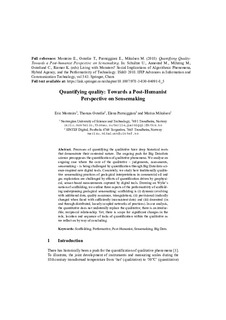Quantifying quality: Towards a Post-Humanist Perspective on Sensemaking
Chapter
Accepted version
Permanent lenke
http://hdl.handle.net/11250/2586671Utgivelsesdato
2018Metadata
Vis full innførselSamlinger
Originalversjon
10.1007/978-3-030-04091-8_5Sammendrag
Processes of quantifying the qualitative have deep historical roots that demonstrate their contested nature. The ongoing push for Big Data/data science presupposes the quantification of qualitative phenomena. We analyse an ongoing case where the core of the qualitative – judgements, assessments, sensemaking – is being challenged by quantification through Big Data/data science-inspired new digital tools. Concretely, we study how traditionally qualitative sensemaking practices of geological interpretations in commercial oil and gas exploration are challenged by efforts of quantification driven by geophysical, sensor-based measurements captured by digital tools. Drawing on Wylie’s notion of scaffolding, we outline three aspects of the performativity of scaffolding underpinning geological sensemaking: scaffolding is (i) dynamic (evolving with additional data, quality assurance, triangulation), (ii) provision-al (radically changed when faced with sufficiently inconsistent data) and (iii) decentred (in and through distributed, loosely coupled networks of practices). In our analysis, the quantitative does not unilaterally replace the qualitative; there is an irreducible, reciprocal relationship. Yet, there is scope for signifi-cant changes in the role, location and sequence of tasks of quantification with-in the qualitative as we reflect on by way of concluding.
